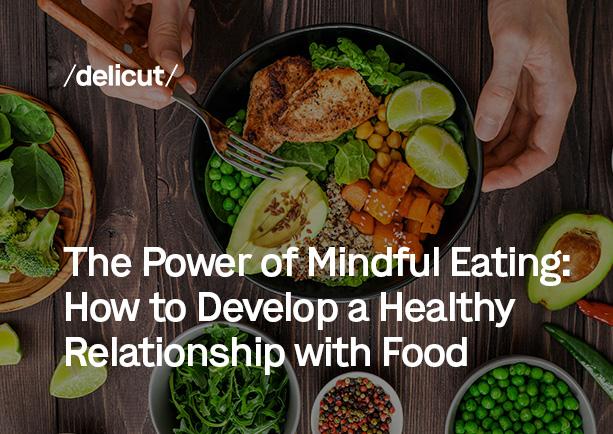The Power of Mindful Eating: How to Develop a Healthy Relationship with Food

In today's fast-paced world, surrendering to mindless eating is effortless. We frequently catch ourselves rushing through meals, juggling multiple tasks, or seeking solace in food during emotional moments.
Nevertheless, nurturing a healthy relationship with food involves more than just the type of food we consume; it's equally essential to consider how we eat. Mindful eating offers a transformative practice that can revolutionize our approach to food, enabling us to develop profound gratitude for nourishment and enhancing our overall well-being.
What is Mindful Eating?
Mindful eating means being fully present in the moment and consciously experiencing the entire process of eating, from savoring the flavors and textures to appreciating the delightful aromas of food. Engage all your senses and tune into your body's hunger and fullness signals.
By embracing mindfulness during meals, you gain a deeper understanding of your body's requirements, make more intentional decisions about what you eat, and cultivate a more nourishing and positive connection with food.
The Benefits of Mindful Eating
Practicing mindful eating and intuitive eating offers a plethora of advantages. First and foremost, it enables us to foster a healthier relationship with food. By slowing down and being mindful of our eating experience, we become more in tune with our body's requirements and can make choices that nourish us. As a result, these changes can lead to better digestion, increased satisfaction, and an overall improved sense of well-being.
Moreover, mindful eating can liberate us from the cycle of emotional eating. Rather than resorting to food to cope with stress, boredom, or other emotions, we can cultivate healthier methods for addressing our emotional needs. This transformation can profoundly impact our mental and emotional well-being, lessening feelings of guilt or shame often associated with food.
Building a Healthy Relationship With Food
A healthy relationship with food entails a balanced, flexible, and optimistic approach to eating. It involves recognizing the link between nutrition and overall health and being receptive to the body's hunger and fullness cues.
Embracing Food as Nourishment and Pleasure
Individuals with a healthy relationship with food do not perceive it as an adversary or a cause for guilt and shame. Instead, they view food as a means of nourishing the body and a source of pleasure. They can enjoy diverse foods without feeling guilty or imposing restrictions on specific food groups.
Flexibility and Mindful Choices
A strong and balanced bond with food embodies flexibility. Individuals who maintain a healthy relationship with food do not feel compelled to adhere to a strict meal plan or diet to achieve well-being. Instead, they can make mindful choices based on their body's requirements and personal preferences.
Listening to Your Body
Furthermore, those with a healthy relationship with food have developed the skill of listening to their body's hunger and fullness cues. They eat when they feel hungry and stop when they feel satiated. There is no compulsion to overindulge or impose restrictions to exert control over their eating habits.
Self-Care and Stress Management
A positive and balanced connection with food includes recognizing the significance of self-care and stress management. People who maintain a healthy relationship with food refrain from using eating as a way to seek comfort or alleviate stress. Instead, they adopt alternative methods to care for themselves, such as exercising regularly, practicing meditation, or spending quality time with their loved ones.
Practicing Mindful Eating
Practicing mindful eating involves being fully present and attentive to your eating experience. Here are some steps to help you get started:
- Slow Down: Eat at a slower pace, savoring each bite. Avoid rushing through your meal. Put down your utensils between bites, and take your time to chew and appreciate the flavors.
- Remove Distractions: Turn off the TV, put away your phone, and create a quiet, distraction-free environment for your meal. This allows you to focus solely on your food.
- Engage Your Senses: Pay attention to the colors, textures, and aromas of your food. Take in the visual appeal of your meal and inhale the scents before taking a bite.
- Chew Thoroughly: Chew your food slowly and thoroughly. This not only aids in digestion but also allows you to savor the taste of each bite.
- Listen to Your Body: Tune in to your body's hunger and fullness cues. Eat when you're hungry and stop when you're satisfied. Avoid overeating by listening to your body's signals.
- Enjoy Each Bite: Focus on the taste and texture of each bite. Notice how the flavors evolve as you chew. Be fully present with your meal.
- Express Gratitude: Take a moment to express gratitude for your food. Consider where it came from and the effort that went into producing it.
- Be Mindful of Portion Sizes: Pay attention to portion sizes and avoid mindlessly overeating. Use smaller plates and utensils if it helps you control portions.
- Practice Mindful Snacking: Apply mindful eating principles to snacks as well. Avoid mindless snacking in front of the TV or computer.
- Reflect on Your Feelings: After your meal, take a moment to reflect on how you feel. Are you satisfied? Did the meal nourish you both physically and emotionally?
- Start Small: If you're new to mindful eating, start with one meal per day or even one meal per week. Gradually incorporate these practices into your routine.
- Be Patient: Mindful eating is a skill that takes time to develop. Be patient with yourself and practice self-compassion along the way.
Remember that mindful eating is about cultivating a positive and healthy relationship with food. It can help you make better food choices, enjoy your meals more, and maintain a healthy weight. Over time, mindful eating can become a natural and intuitive way of nourishing your body.
Conclusion
Remember to be kind to yourself and practice patience. Transforming your relationship with food is a journey, not a fixed destination. It's wonderful to encounter mistakes or setbacks along the way. The crucial aspect is to continue progressing and working towards fostering a healthier connection with food.
Resetting your relationship with food can be manageable and straightforward. By prioritizing listening to your body, incorporating balance and variety into your diet, discovering healthy ways to manage stress and emotions, and offering yourself grace and patience, you can gradually rebuild a positive relationship with food.
Always remember that even the most minor steps can lead to significant changes. Start from where you are and keep moving forward.
FAQs
1. What is the power of a healthy relationship with food?
The power of a healthy relationship with food is its positive impact on overall well-being, promoting physical and emotional health.
2. How does mindful eating improve your relationship with food?
Mindful eating improves your relationship with food by helping you become more attuned to your body's hunger and fullness signals. It allows you to make conscious food choices based on nourishment and enjoyment rather than emotional or impulsive reasons.
By practicing mindful eating, you develop a greater appreciation for food and its impact on your well-being, leading to a more balanced and positive relationship with what you eat.
3. What is the power of mindful eating?
The power of mindful eating lies in its ability to transform your relationship with food. By practicing mindful eating, you become more aware of your body's hunger and fullness cues, make healthier food choices, and develop a deeper appreciation for your food. This mindful approach can improve digestion, reduce emotional eating, and improve overall well-being. Additionally, mindful eating supports sustainable food systems and fosters a healthier connection with your body and the environment.
4. How do you teach healthy relationships with food?
Teaching healthy relationships with food involves:
- Education: Teach balanced nutrition, portion control, and the impact of foods on health.
- Mindful Eating: Encourage awareness of hunger, fullness, and conscious food choices.
- Eliminate Food Guilt: Emphasize all foods fitting into a healthy diet without guilt.
- Foster Positive Body Image: Promote self-acceptance beyond appearance.
- Encourage Cooking: Inspire cooking with fresh, whole ingredients.
- Emphasise Sustainability: Educate about sustainable food choices.
- Address Emotional Eating: Provide tools for managing emotions without food.
- Encourage Balanced Lifestyle: Promote physical activity and stress reduction.
- Individualized Approach: Tailor advice to individual needs.
- Professional Support: Seek specialized help for eating disorders or complex issues.
5. What are 3 tips for building a healthy relationship with food?
- Three tips to build a healthy relationship with food include:
- Engage in mindful eating to heighten awareness of hunger and fullness signals.
- Embrace a balanced and varied diet with nourishing and enjoyable foods.
- Address emotions and stress through non-food coping mechanisms.
Trending Searches:
Meal Plan Dubai | Affordable Meal Plans Abu Dhabi | Meal Plan Ajman | Meal Plan Al In | Meal Plan Sharjah | Meal Plan Subscription
Related Blogs
The Burnout Diet
Jan 30, 2026 | 8The mental load of “What should I eat today?"
Jan 22, 2026 | 8The real glow-up starts with your gut health
Jan 14, 2026 | 8Healthy food that doesn’t taste like “Diet Food”
Jan 17, 2026 | 8Why do most people in the UAE get their calories wrong
Dec 8, 2025 | 6DASH Diet Meal Plan
Nov 11, 2025 | 8Fatty Liver Meal Plan
Oct 31, 2025 | 8Pregnancy Diet Meal Plan
Oct 27, 2025 | 82000 Calorie Meal Plan
Oct 1, 2025 | 8Intermittent Fasting Diet Plan
Sep 5, 2025 | 8






